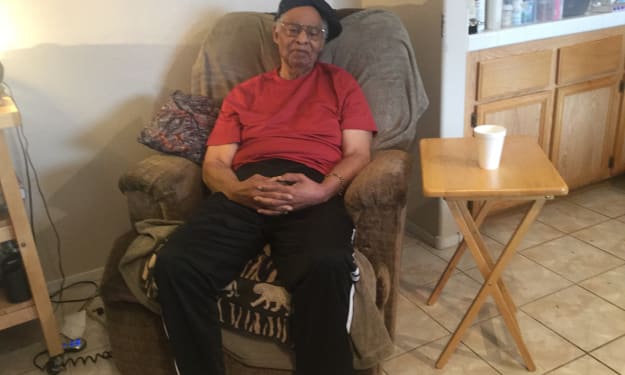
Unless you’ve walked in the shoes of a caregivers of patients with brain disorders, you can never truly relate to this journey. This journey is really about the reality world of these patients. It’s about speaking Alzheimer’s. It’s about discerning the language of the patient with dementia. It’s about understanding, that this disease is so much harder on the patients than you can even imagine. Sure, caregivers have struggles but we are blessed to have sound and healthy minds. Imagine for a moment, listening to gibberish in your mind telling you a million things at one time. Imagine being disoriented, unbalanced trying to figure out what’s going on in your head and trying to figure out why you cannot explain what’s happening to you, when you know something isn’t right. Imagine being frightened, wanting someone to understand you, help you, protect you but you can’t bring yourself to trust anyone because you don’t recognize trust and don’t know how to ask for help.
In our journey, I’ve been able to stabilize much of this fear and distrust by maintaining consistency in caregivers, medical staffers and our daily routine. That includes my simple conversations with my husband who was diagnosed with Alzheimer’s in 2009. Certain terms are consistent, ie, “are you hurting, are you hungry, do you want water, how are you feeling, I’m going to the bathroom and I’ll be right back,,,,when I return, I’m back like I told you, what’s your name, chew your food, don’t talk while you’re eating, swallow your food, drink some water, do you want some more, food, etc. “, .....in our interaction, the repetitiveness of very short sentences create long term memories.
This takes time, patience and diligence. And, initially, it’s not easy. However, over time it becomes routine and a way of life. It takes the desire to want to give your loved one or patient the best care and life possible while they are battling this devastation. You are a companion, protector, parent, friend, babysitter...you wear many hats and walk a very weary tightrope for quite a while. No two patients are alike, however, care with dignity, compassion, respect, kindness, patience and love helps you create the niche necessary to care for each patient
Simply, remember, caregivers are in constant on-the-job- training mode We learn from our mistakes...and that’s not to repeat them but find alternatives to do it better or differently
Understand, what I’m sharing is our ALZ journey....our experiences, alternatives that have worked for us making our journey easier. The only resources available to enhance caregiving comes directly from the caregivers I’ve shared and received much needed information from social media groups...”MyALZTeam” an awesome and informative group.
Speaking and understanding Alzheimer’s/Dementia language is simply recognizing gestures, facial expressions, grimaces, etc. Becoming familiar with your patients is crucial in identifying ways to help them. In my husband’s case, I noticed him patting his head periodically. Other times he’d scratch his head. I began documenting and questioning him by asking him if his head was hurting. If he didn’t answer me right away, I would ask him if he was hurting. Sometimes his response was, “yes”. I would them ask him to show me where it was hurting him. If he pointed to any part of his body I knew he was in pain. And, sometimes he would point to his head, I knew then to give him something for pain. He’s familiar with the word “ hurt” not the word “ pain”. We never use the word pain. Whenever I see him flinching or grimacing, I know something is bothering him or he’s in pain. This is when we go into methods of elimination in figuring out what’s going on. It’s simply a matter of asking him to touch where it hurts and you lightly touching various parts of his body and watching his facial expressions or his flinching.
Specifically speaking, in our situation, a flinch from him probably saved his life. A nurse from a home health care facility came to do a routine visit and recertification for his home care. For some reason, still unknown to me, she decided to perform a straight catheterizing on him to obtain a urine specimen from him. After a few minutes, she wasn’t getting any urine but was requesting for the caregiver to give him more water. My gut told me to tell her to take the catheter out. I then raised my voice and told her to take it out immediately. She took it out, two hours later we were in ER with a severe infection. My husband was unresponsive for two days. I later learned the nurse had performed an unauthorized, improper insertion. I know now to question each person for authorizations for any procedure, to include drawing blood. I also learned this improper insertion could have been fatal.
When he’s scratching his head, we wash his hair and/or oil his scalp or brush his hair. We then ask him if it feels better. And, most often he responds, “ yes, it does.”
Grinding teeth in individuals with brain disorders is not always a simply common trait of the elderly. I learned in my husband that he was actually having pain in a tooth and his gums. Because he’s bedridden, it’s very difficult to get dental treatments. My alternative was buying over the counter mouth washes for his gums and teeth. Additionally, holistically, Clove oil does suppress toothache. Using these methods of rubbing his gums and teeth with the mouth wash and rubbing on the clove oil caused the teeth grinding to diminish....to be continued
About the Creator
Patricia Stone
Native of Gary, Indiana, graduated from Indiana University with a MPA, completed classes at the Federal Law Enforcement Training Center; retired from the United States Federal Government, NASA after an extensive career in law enforcement.






Comments
There are no comments for this story
Be the first to respond and start the conversation.